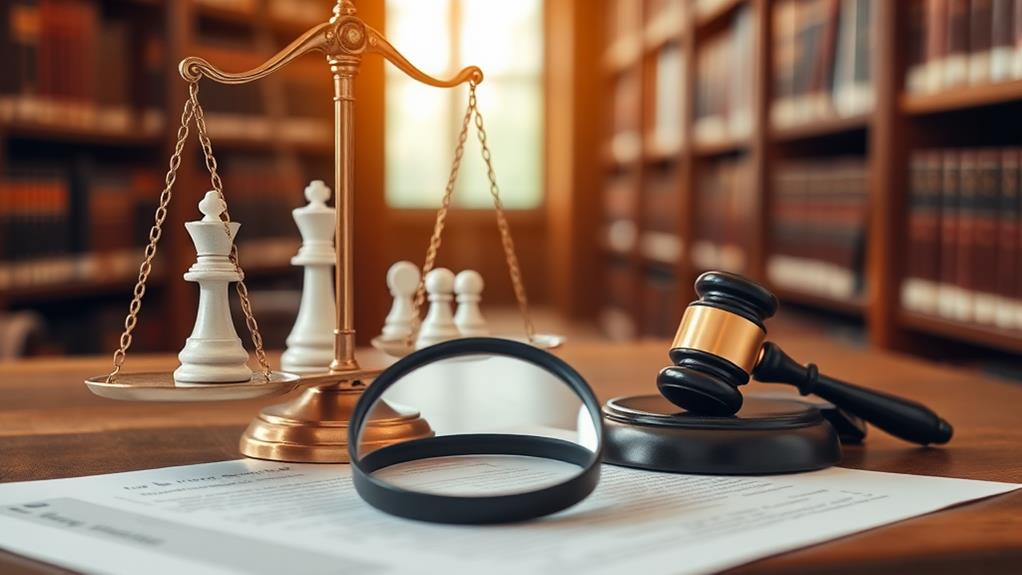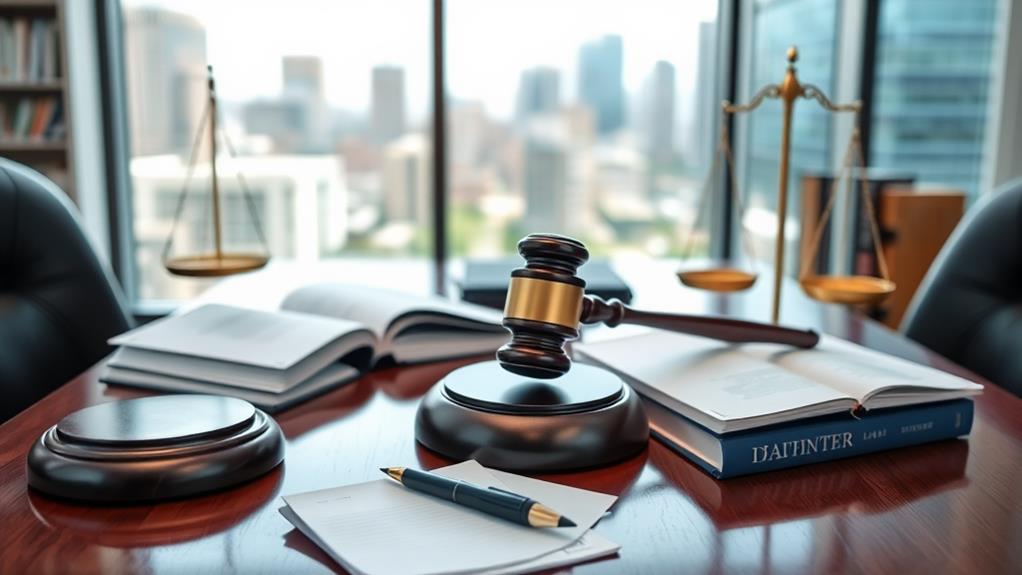When hiring an attorney, start by evaluating their experience with similar legal matters and familiarity with the relevant laws. Assess their commitment by checking workload, availability, and absence of conflicts of interest. Their strategy and approach should include tailored legal solutions and transparent fees. Guarantee effective communication by confirming they explain legal concepts clearly and respond promptly. Understand different billing structures and potential additional costs. Each factor plays an essential role in choosing the attorney best suited to your needs. As you explore further, you'll discover more about what makes an attorney effective and trustworthy.
Evaluating Experience and Expertise

When you're hiring an attorney, it's vital to evaluate their experience and expertise carefully. This evaluation guarantees you receive competent legal representation tailored to your needs.
Start by considering the attorney's years of practice in legal matters relevant to your case. Their track record can reveal how effectively they've managed similar situations, particularly in complex cases. Successful navigation of these intricate legal issues often leads to favorable outcomes, showcasing their capability and strategic thinking.
Additionally, familiarize yourself with the attorney's expertise in specific areas, such as employment laws, if applicable to your situation. An attorney well-versed in relevant laws and regulations will provide sound legal advice and representation.
Verify their ability to handle the complexities of your jurisdiction's legal landscape. It's also important to assess whether the attorney is willing to refer you to another counsel if your case requires specialized knowledge beyond their expertise.
This openness indicates a commitment to securing the best possible outcome for you. By thoroughly examining these factors, you'll make a more informed decision, guaranteeing the attorney you choose possesses the necessary skills and experience to handle your legal matters effectively.
Assessing Commitment and Resources
After evaluating an attorney's experience and expertise, it's equally important to assess their commitment and resources. Ensuring they've enough time and availability for your specific legal needs is essential. You should ask about their current workload to gauge if they can dedicate the necessary attention to your case.
An experienced attorney should have the resources, such as legal research tools and support staff, to manage your legal issues effectively. Consider the attorney's readiness to engage in extensive legal research, especially when complex legal issues arise. Their commitment to understanding your case deeply is crucial for protecting your legal rights.
It's also essential to evaluate their ability to prioritize your case among other commitments. This prioritization can greatly impact the level of detail they provide. Inquire about any potential conflicts of interest that might affect their dedication to your case. You want an attorney whose focus remains solely on your legal matters.
Analyzing Strategy and Approach

A critical aspect of hiring an attorney is analyzing their strategy and approach to your case. You should consider how the attorney provides tailored legal strategies that meet your specific needs and goals.
A lawyer with a proactive approach is essential, as they should anticipate challenges and adapt strategies as legal matters evolve. Experience is vital in this regard; past case outcomes often showcase an attorney's strategic effectiveness and ability to achieve favorable results for clients.
When evaluating strategies, look for evidence of strong negotiation skills. An attorney who can skillfully negotiate settlements in your best interest can save time and resources, minimizing the need for litigation.
It's also important that the attorney is ready to engage in extensive legal research, ensuring all relevant laws and regulations are thoroughly considered.
Consider these points when hiring:
- Proactive approach: Does the attorney anticipate challenges and adapt strategies?
- Experience and past outcomes: Are their past results indicative of effectiveness?
- Fee structure and trust advisor: Is the fee structure transparent, and does the attorney serve as a trusted advisor?
These elements are significant in making important decisions about which attorney to hire, ensuring their strategy aligns with your legal needs.
Ensuring Effective Communication
Analyzing an attorney's strategy is only part of the equation; effective communication is equally important in building a successful client-attorney relationship. A good lawyer guarantees that you understand legal concepts by explaining them in clear, understandable terms. This comprehension is essential for you to make informed decisions about your case.
Additionally, an attorney should be responsive to calls and emails within a reasonable timeframe. This not only maintains open communication but also addresses your concerns promptly, fostering a sense of trust.
Listening actively is another key component. Your attorney should engage with you, showing a willingness to address your concerns and incorporate your feedback into their legal strategy. This active listening helps to establish a comfortable rapport, encouraging you to discuss sensitive matters openly, which can lead to better representation and outcomes.
Regular updates and transparent communication about case progress are significant. These practices keep you informed about any developments, reinforcing trust in your attorney-client relationship.
Ultimately, when you feel comfortable and well-informed, you're more likely to have confidence in your attorney's ability to represent you effectively. Investing in these communication aspects is critical for a successful legal partnership.
Understanding Legal Fees and Costs

When hiring an attorney, understanding their fees and costs is vital. Legal services can be pricey, and knowing what to expect helps you budget and make informed decisions.
Lawyers typically charge hourly, with rates ranging from $100 to over $1,000, or offer a flat fee for specific tasks. Contemplate hiring a lawyer who can advise on the best structure for your needs, whether you're facing a legal dispute or need help with routine matters.
Discussing the billing structure upfront is fundamental. Understanding potential additional costs, like court or filing fees, prevents surprises later.
Here are some factors to take into account when evaluating legal fees:
- Hourly Fee: Some lawyers charge hourly, and while a higher rate might indicate experience, it doesn't always mean quicker results.
- Flat Fee: For predictable legal services, like drafting contracts, this option offers clarity on costs.
- Contingency Fees: Often used in personal injury cases, you pay only if you win, usually 25% to 40% of the settlement.
Comparing efficiency and outcomes of attorneys at different rates is wise.
Conclusion
In your quest to hire the ideal attorney, you've probably realized that it's not just about finding someone with a law degree. Ironically, while legal expertise is essential, understanding their commitment, strategy, and communication style is equally important. You'll need to weigh the costs carefully, as legal fees can sometimes feel like they require their own legal advice. Remember, choosing the right attorney means balancing these factors thoughtfully to guarantee your interests are well-represented.


Leave a Reply